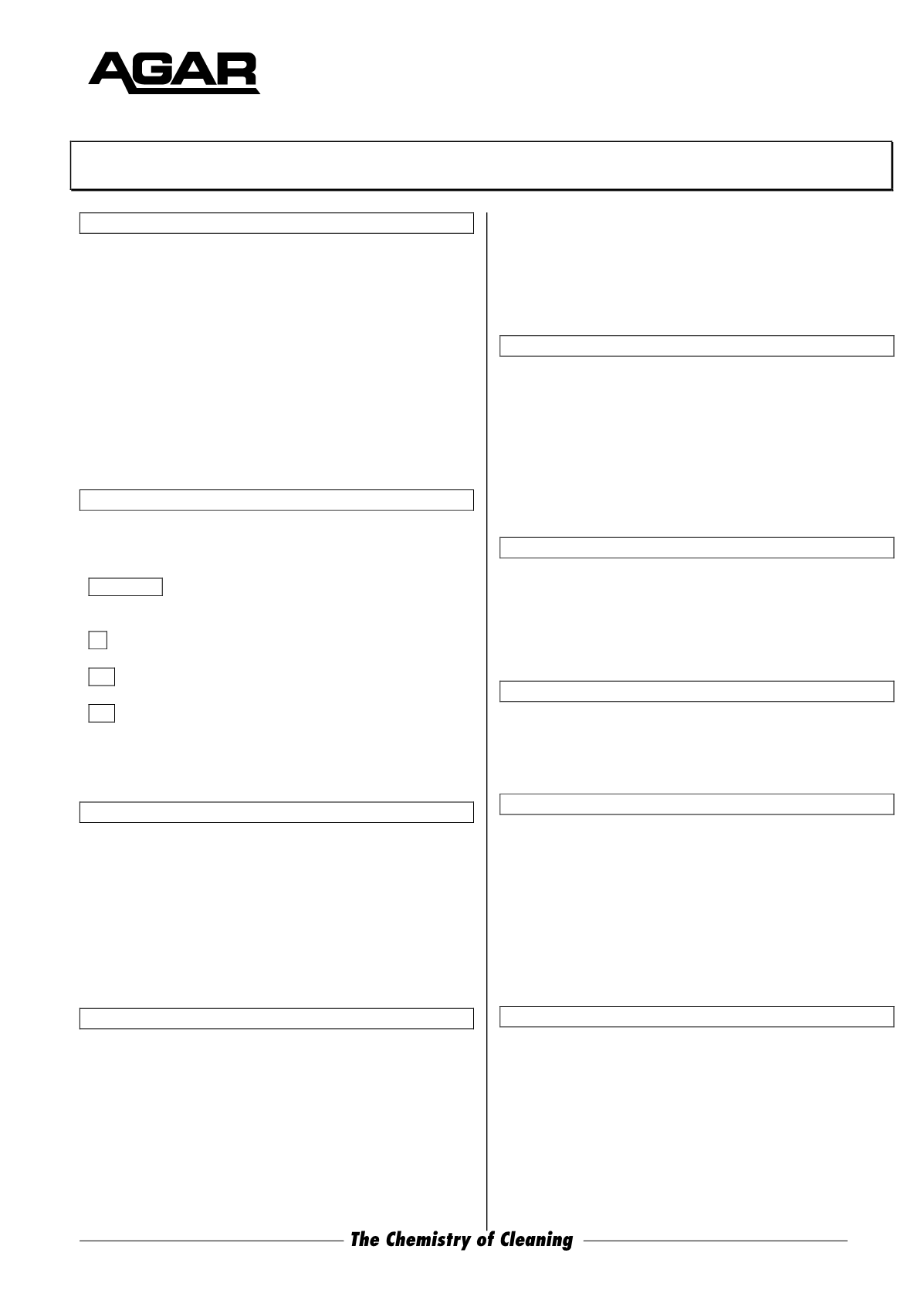

ABN 80 004 726 890
MADE IN AUSTRALIA
VIC 03 9480 3000
NSW 02 9743 6020
SA 08 8293 2020
QLD 07 3205 7244
WA 08 9249 4566
Safety Data Sheet
Issued: April 24, 2011
Page 1 of 2
SAFETY BLEACH
1 IDENTIFICATION OF THE MATERIAL AND SUPPLIER
Product Name:
SAFETY BLEACH
Other Names: None
Manufacturer's Product Code: SAF10
Product Use: Cleaning, whitening and sanitising in the laundry.
COMPANY DETAILS
Company: Agar Cleaning Systems Pty. Ltd.
Address: 12-14 Cope Street, Preston, Vic. 3072
Telephone: 03 9480 3000 Facsimile: 03 9480 5100
Web:
www.agar.com.auAgar SDS are available from this website.
E-mail:
admin@agar.com.auEmergency Telephone Number: 131 126
(Aust wide)
2 HAZARDS IDENTIFICATION
Hazardous according to criteria of Safe Work Australia.
Irritant Xi
R36//37/38 Irritating to eyes, respiratory system and
skin.
S2 Keep out of reach of children.
S22 Do not breathe dust.
S26
In case of contact with eyes, rinse immediately
with plenty of water and seek medical advice.
Safety Bleach becomes non-hazardous at concentrations below
25% in water.
3 COMPOSITION / INFORMATION ON INGREDIENTS
Ingredients:
Chemical Entity: CAS No.: Proportion:
Sodium carbonate 497-19-8 30 - < 60%
Sodium percarbonate 15630-89-4 30 - < 60%
Sodium silicate - 10 - < 30%
Sodium metasilicate 6834-92-0 < 10%
Tetrasodium ethylene diamine
tetra-acetate 64-02-8 < 10%
Surfactants and other non-
hazardous ingredients to 100%
4 FIRST AID MEASURES
Poisons Information Centre: Phone 131 126
Swallowed: If poisoning occurs, contact a doctor or Poisons
Information Centre. If swallowed, do NOT induce vomiting.
Give a glass of water to drink. Rinse mouth with water. Never
give anything by mouth to an unconscious person.
Eye: Immediately hold the eyes open and wash continuously for
at least 15 minutes with fresh running water. Ensure irrigation
under eyelids by occasionally lifting the upper and lower lids.
Transport to hospital or doctor without delay. Removal of
contact lenses after an eye injury should only be undertaken
by skilled personnel.
Skin: Remove any contaminated clothing and flush area with
water and soap if available. Seek medical attention in the
event of irritation.
Inhaled: If any effects are observed, remove affected person to
fresh air. Lay patient down, keep warm and rested. If
breathing is shallow or has stopped, ensure clear airway and
apply resuscitation. Call a doctor.
5 FIRE FIGHTING MEASURES
Fire/Explosion Hazard: Safety Bleach is not combustible, but
may react with combustible materials and support combustion.
Fire Extinguishing media: Water spray or fog. Foam. Dry
chemical powder. Carbon dioxide.
Special fire-fighting procedures: None.
Unusual fire hazards: None.
Hazardous products of combustion: Thermal decomposition at
temperatures above 200ºC or in a large fire may yield toxic
fumes which my cause severe eye, nose, throat and lung
irritation. Use adequate ventilation.
6 ACCIDENTAL RELEASE MEASURES
Clean up all spills immediately. Do not mix with combustibles
like sawdust or paper. Avoid contact with skin and eyes.
Contain spill and mop up. Place in a suitable, labelled container
for waste disposal.
If spilled on clothing, remove and launder before re-use.
7 HANDLING AND STORAGE
Storage and Transport: Store in a cool, dry place.
Incompatibility (Materials to avoid for purposes of transport,
handling and storage only): Avoid strong reducing agents.
8 EXPOSURE CONTROLS / PERSONAL PROTECTION
Exposure Standards: None assigned for this mixture.
Engineering Controls: Mechanical ventilation: Not required
under normal conditions.
Personal Protection:
Gloves - Wear rubber gloves if prolonged skin contact is
anticipated.
Eye-protection - Safety glasses not normally worn.
Respiratory – Wear a dust-mask if dust is likely to be
generated.
9 PHYSICAL AND CHEMICAL PROPERTIES
Appearance: White powder
Odour: None
pH = 11 – 12 (1% solution)
Vapour Pressure: N/K
Vapour Density: N/K
Boiling Point : N/A
Freezing Point: < 0
°
C
Solubility in water: Soluble
Specific Gravity : N/K
Evaporation rate: Non-volatile
% Volatile by vol: < 10%
Please turn to page 2.


















